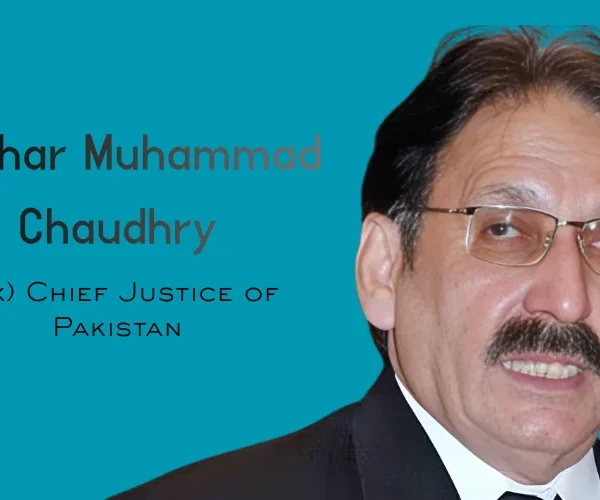Altaf Hussain is one of the most well-known political figures from Pakistan and the founder of the Muttahida Qaumi Movement (MQM). Born and raised in Karachi, he started his journey as a student activist and later built MQM into a powerful political party that shaped the politics of urban Sindh, especially Karachi and Hyderabad.
Often called “Altaf Bhai” by his supporters, he became the voice of the Muhajir community and played a major role in their representation in Pakistani politics. Over the years, his leadership has been marked by both influence and controversy, making him one of the most talked-about leaders in the country.
Today, Altaf Hussain continues to remain in the spotlight because of his political legacy, speeches, and the ongoing debates about his role in Pakistan’s history. His life story is a mix of political rise, exile in London, and lasting impact on Karachi’s political landscape.
Quick Info Table – Altaf Hussain (MQM Founder)
| Attribute | Details |
|---|---|
| Full Name | Altaf Hussain |
| Popular Name | Altaf Bhai |
| Date of Birth | 17 September 1953 |
| Place of Birth | Karachi, Pakistan |
| Age | 71 years (as of 2025) |
| Nationality | Pakistani, British |
| Community / Caste | Muhajir, Arain |
| Education | B.Sc. (Pharmacy) – University of Karachi |
| Political Party | Founder of MQM (Muttahida Qaumi Movement) |
| Known For | Muhajir politics, leadership of MQM, exile in London |
| Spouse | Faiza Gabol |
| Children | Daughter – Afzaa Altaf |
| Residence | London, United Kingdom |
| Net Worth | Multi-million (properties & assets in UK) |
Early Life and Family Background
Altaf Hussain was born on 17 September 1953 in Karachi, Pakistan, into a Muhajir family that had migrated to the city after the partition of the Indian subcontinent. His family belonged to the Arain community, and like many migrant families, they carried stories of struggle, adjustment, and a search for identity in their new homeland.
His father, Nazir Hussain, and mother, Khursheed Begum, played a strong role in shaping his values. Altaf grew up with siblings in a modest household in Karachi, where he witnessed first-hand the challenges faced by the Muhajir community. These early experiences created a sense of responsibility in him that later influenced his political vision.
Education and Student Activism
Altaf Hussain completed his early schooling in Karachi before joining the University of Karachi, where he pursued a Bachelor of Pharmacy (B.Pharm) degree. His years at the university were not only about academics but also about building connections with fellow students and understanding the issues faced by Muhajirs in educational and social spaces.
In 1978, Altaf founded the All Pakistan Muhajir Students Organization (APMSO), which soon became the starting point of his political journey. The APMSO was formed to raise a collective voice for the Muhajir students and highlight the discrimination they often felt in academic institutions. This student activism laid the foundation for what would later become the Muttahida Qaumi Movement (MQM).
Also Read This: Imran Ahmed Khan Biography
Foundation of MQM
In 1984, Altaf Hussain transformed his student movement, APMSO, into a political party known as the Muttahida Qaumi Movement (MQM). The party was initially called the Muhajir Qaumi Movement, highlighting the struggles and identity of the Muhajir community in Karachi and other parts of Sindh.
The foundation of MQM gave Muhajirs a strong political platform for the first time. The party’s message quickly spread across Karachi and Hyderabad, and Altaf Hussain’s speeches drew huge crowds. The first major rally at Pacco Qillo in 1986 became a turning point, establishing MQM as a force in Pakistan’s politics.
Political Career and Influence
By the late 1980s, MQM had become a key political player in Pakistan. In the 1988 general elections, MQM won a large number of seats in Karachi and Hyderabad, proving its influence in urban Sindh. Altaf Hussain, known popularly as Altaf Bhai, became a household name, especially among Muhajirs who saw him as their representative.
MQM’s rise also brought political alliances and rivalries. The party often clashed with the Pakistan People’s Party (PPP) in Sindh and played an important role in coalition governments at the federal level. Altaf Hussain’s taqreer (speeches), delivered with passion and emotional appeal, became his signature style, often broadcast live to massive audiences.
Exile and Leadership from London
In 1992, following Operation Clean-up in Karachi, Altaf Hussain left Pakistan and went into self-exile in London, where he continues to live. From London, he controlled MQM through frequent telephonic and video speeches, which were relayed to his supporters in Karachi.
During his years abroad, Altaf Hussain obtained British nationality and established the MQM International Secretariat. While his leadership style kept the party united for many years, his exile also brought new controversies. Scotland Yard investigations in London, including cases related to money laundering and hate speech, often kept him in the headlines.
Despite being away from Pakistan, Altaf Hussain maintained significant influence in Karachi’s politics for decades. His supporters continued to call him Altaf Bhai, and his speeches often shaped the direction of urban Sindh’s political landscape.
Controversies and Criticism
Altaf Hussain’s political career has been surrounded by controversies. During the 1980s and 1990s, MQM was often accused of being involved in target killings, extortion, and violent clashes in Karachi. The 1992 Operation Clean-up launched by the Pakistan Army was aimed at curbing MQM’s influence, which forced Altaf into self-exile.
In later years, he faced serious hate speech accusations, leading to a complete ban on his speeches in Pakistan. His most controversial moment came on 22 August 2016, when his anti-Pakistan remarks sparked widespread criticism, riots, and a crackdown against MQM offices.
Internationally, Altaf Hussain also faced cases in the UK, including money laundering and hate speech investigations by Scotland Yard. While many of these cases were later dropped, they added to his image as a controversial leader who divided public opinion.
Rumors and Health Updates
Over the years, Altaf Hussain has frequently been the subject of rumors about his health and even false reports of his death. Queries such as is Altaf Hussain alive, Altaf Hussain dead, Altaf Hussain died, Altaf Hussain is dead, and death of Altaf Hussain regularly circulate online, showing the level of public curiosity around his status.
Despite these rumors, official statements and media reports have clarified that while he has faced health problems and hospitalizations in London, Altaf Hussain is alive. In 2025, reports confirmed that he was admitted to a hospital in London due to health issues, which once again brought him into the spotlight.
Personal Life
Away from politics, Altaf Hussain’s personal life has also attracted attention. He married Faiza Gabol, and together they have a daughter named Afzaa Altaf. His daughter has often been mentioned in media discussions, especially regarding her education and life in London.
Altaf Hussain’s family largely stays out of the political spotlight and maintains privacy. His wife and daughter reside with him in the UK, where he continues to live in exile. Despite controversies, his family background and connections remain an important part of his public image.
Also Read This: Nawaz Sharif Biography
Net Worth and Lifestyle
Altaf Hussain has lived in London since 1992, and over the years, his net worth and lifestyle have remained topics of discussion. Various reports suggest that he owns properties and other assets in the UK, with an estimated value in the millions. While exact figures are not publicly available, his financial status is often linked to MQM’s funding and support from overseas communities.
His residence in London reflects a comfortable lifestyle, though it is modest compared to other political leaders. Media reports frequently discuss his income sources and property holdings, fueling debates about his wealth.
Media and Public Perception
Altaf Hussain has always been a media-savvy political leader. His fiery speeches, broadcast live to audiences in Pakistan, earned him both loyal supporters and strong critics. Known popularly as “Altaf Bhai”, he cultivated a cult-like following among his supporters, especially in Karachi.
Media coverage often focuses on his pictures, old photos, and wedding images, reflecting the public’s curiosity about his personal life. At the same time, his political speeches remain heavily scrutinized, especially after bans were imposed on their broadcast in Pakistan.
Legacy and Impact
Despite controversies, Altaf Hussain’s role in shaping Karachi’s political landscape cannot be ignored. As the founder of MQM, he gave the Muhajir community a powerful voice in Pakistani politics. For decades, MQM controlled Karachi’s politics, and Altaf Hussain was regarded as the kingmaker in Sindh.
His name is even associated with places like Altaf Hussain Road in Karachi, reflecting his deep imprint on the city. However, his legacy is divided, while many credit him for empowering Muhajirs and transforming urban Sindh politics, others criticize him for authoritarian control and the violent image of MQM.
Today, even after years in exile, Altaf Hussain continues to influence debates about Muhajir identity, diaspora politics, and the future of Karachi.
Frequently Asked Questions (FAQs)
Q1: Who is Altaf Hussain
Altaf Hussain is the founder of the Muttahida Qaumi Movement (MQM) and one of the most influential political leaders from Karachi.
Q2: What is the age of Altaf Hussain
He was born on 17 September 1953 in Karachi. As of 2025, he is 71 years old.
Q3: Who is the wife of Altaf Hussain
Altaf Hussain is married to Faiza Gabol.
Q4: Does Altaf Hussain have children
Yes, he has a daughter named Afzaa Altaf.
Q5: Is Altaf Hussain alive today
Yes, despite many rumors about his health and false reports of death, he is alive and currently living in London.
Q6: Why did Altaf Hussain leave Pakistan
In 1992, during Operation Clean-up in Karachi, Altaf Hussain moved to London and has been living there since then.
Q7: What happened on 22 August 2016 related to Altaf Hussain
On this date, his controversial speech created strong criticism in Pakistan which led to a ban on his speeches and a crackdown against MQM offices.
Q8: What is the net worth of Altaf Hussain
While the exact figures are not confirmed, reports suggest that he owns properties and assets in the UK worth millions.
Final Words
Altaf Hussain’s life story is one of power, controversy, and lasting impact. As the founder of MQM, he gave the Muhajir community a strong political voice and changed the politics of urban Sindh. His speeches, leadership style, and ability to mobilize people made him one of the most important political figures in Pakistan’s recent history.
At the same time, his career has faced criticism because of allegations of violence, financial scandals, and his anti-Pakistan speech in 2016. Living in exile in London for more than three decades, Altaf Hussain remains a highly discussed figure.
For many, he is remembered as the leader who empowered the Muhajirs, while for others, he is a symbol of division and controversy. No matter the opinion, Altaf Hussain’s name will always be linked with the politics of Karachi and the history of MQM.




